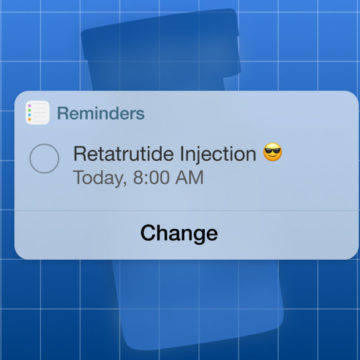Every medication can cause side effects, and Mounjaro is no different. If you’re just starting your weight management treatment, it’s important to know which symptoms you may experience and how you can manage them.
Here, our experts break down common and serious side effects, and offer tips to relieve discomfort and make your treatment as easy as possible.
What is Mounjaro and how does it work?
Mounjaro is a weight loss injection which contains the active ingredient tirzepatide. It works by mimicking two hormones naturally released by the gut, GIP and GLP-1. It is used to help with weight loss because it:
- Reduces hunger: Tirzepatide mimics the hormones that tell your brain that you’re full.
- Keeps you fuller longer: Tirzepatide slows digestion, helping you stay full between meals.
- Regulates blood sugar: Tirzepatide helps keep blood sugar stable, reducing cravings.
- Silences ‘food noise’: Tirzepatide influences the part of your brain that controls appetite to reduce food focused thoughts. [1]
Mounjaro’s dual action makes it more effective for weight loss than semaglutide (e.g Ozempic, Wegovy), which only activates GLP-1 receptors. [2] A major study showed that tirzepatide users lost 20.9% of their weight in 72 weeks when combined with diet and exercise changes. [3]
Common Mounjaro side effects
Side effects are most common when starting tirzepatide but tend to improve over time for most people. The most common side effects of tirzepatide for weight loss include:
- Nausea (up to 33.3%)
- Diarrhoea (up to 23.0%)
- Constipation (up to 17.1%)
- Indigestion (up to 11.3%)
- Vomiting (up to 12.2%)
Other common side effects: injection site reactions, dizziness, stomach pain, bloating, gas, fatigue, hair loss, and increased heart rate. [4]
You may also have a decreased appetite due to the drug helping to slow your digestion. If you are experiencing side effects like constipation and indigestion, you can manage this by maintaining a healthy fibre-rich diet, staying hydrated and doing regular exercise. Changing your diet can also help alleviate vomiting and diarrhoea. Continue reading for more detailed information on that below.
It’s important that you monitor any side effects and consult your clinical team if they continue or become worse.
Who shouldn’t use Mounjaro?
Mounjaro isn’t suitable for you if you’re currently pregnant or breastfeeding. You should stop taking tirzepatide at least one month before a planned pregnancy, as that’s how long it takes to leave your system completely. Remember, tirzepatide may make your oral birth control less effective by lowering hormone levels in your blood. Use condoms or switch to a non-oral method like an IUD to stay protected. [5]
Do not use Mounjaro if you have a personal or family history of medullary thyroid carcinoma (MTC) or if you have Multiple Endocrine Neoplasia syndrome type 2 (MEN 2). [2]
You also shouldn’t take Mounjaro if you’re allergic to tirzepatide or any other ingredients in the medication. Severe allergic reactions are rare, but you should seek immediate medical attention if you notice a skin rash, throat swelling or difficulty breathing.
If you have pre-existing conditions like kidney issues, a history of pancreatitis or severe digestive problems, speak to your doctor before starting Mounjaro.
Serious side effects and warnings
Other rare side effects of Mounjaro may include pancreatitis – a potentially life-threatening condition requiring immediate emergency care, or gallbladder disease. [2]
For more information about side effects, you can view the Mounjaro patient information leaflet here.
When to seek medical attention
Seek medical advice if you notice any symptoms of pancreatitis. This includes sudden, severe stomach pain, feeling or being sick and a high temperature of 38 °C or more (fever). [7]
You should also seek urgent medical advice if you experience symptoms of an allergic reaction, such as difficulty breathing, a skin rash or swelling of the lips, face or tongue. Experiencing severe pain underneath your right ribcage (that may spread to your shoulder or back) can indicate acute gallbladder problems. This may be accompanied by vomiting, a high temperature or a rapid heartbeat and requires immediate medical attention.
Managing side effects
Consistency is key when taking Mounjaro, so it’s important that you’re comfortable with your dosage. Here are some tips you can follow to keep side effects at bay:
Diet
To reduce nausea and vomiting, eat small portions, limit fatty and spicy foods, avoid strong smells and eat crackers, mint, or ginger-based foods or drinks. [6] For constipation, include high-fibre foods and plenty of fluids in your diet. Stay hydrated and rest to manage diarrhoea [8].
Medication
Over-the-counter antacids may help with heartburn [8]. If side effects are severe or persistent, contact our clinical team for support.
Dosage and storage
If you miss a dose, take it as soon as you remember within four days. If it’s been more than four days, skip it and take the next dose as usual on your scheduled day. Mounjaro can be stored at room temperature for up to 30 days (not above 30 °C) after removal from the fridge. [1].
Remember, most side effects tend to resolve as your body adjusts to the medication. If they’re severe or persistent, contact your clinical team for support.
Got a question about side effects? Speak to our dedicated clinical team for any extra support. If you haven’t started your weight loss journey and want to learn more, find out what treatment is suitable for you on our website.
References
1. Mounjaro KwikPen 10mg solution for injection in pre-filled pen – Summary of Product Characteristics (SmPC) – (emc) [Internet]. www.medicines.org.uk. Available from: https://www.medicines.org.uk/emc/product/15484/smpc#gref
2. Mounjaro: Uses, Dosage, Side Effects & Warnings [Internet]. Drugs.com. Available from: https://www.drugs.com/mounjaro.html
3. Jastreboff AM, Aronne LJ, Ahmad NN, Wharton S, Connery L, Alves B, et al. Tirzepatide Once Weekly for the Treatment of Obesity. New England Journal of Medicine [Internet]. 2022 Jun 4;387(3):205–16. Available from: https://www.nejm.org/doi/full/10.1056/NEJMoa2206038
4. Mounjaro KwikPen 2.5mg solution for injection in pre-filled pen – Summary of Product Characteristics (SmPC) – (emc)
5. Skelley JW, Swearengin K, York AL, Glover LH. The impact of tirzepatide and glucagon-like peptide 1 receptor agonists on oral hormonal contraception. J Am Pharm Assoc (2003). 2024 Jan-Feb;64(1):204-211.e4. doi: 10.1016/j.japh.2023.10.037. Epub 2023 Nov 7. PMID: 37940101.
6. 1.Mounjaro Side Effects: Common & Serious Risks [Internet]. Drugwatch.com. 2024. Available from: https://www.drugwatch.com/drugs/mounjaro/side-effects/
7. NHS. Acute pancreatitis [Internet]. nhs.uk. 2022. Available from: https://www.nhs.uk/conditions/acute-pancreatitis/
8. Mounjaro Side Effects: What They Are and How to Manage Them [Internet]. Healthline. 2023. Available from: https://www.healthline.com/health/drugs/mounjaro-side-effects
Next review date: 13/10/2028



